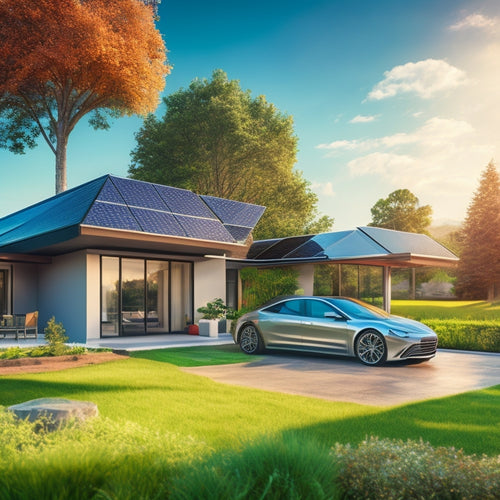
Why Renewable Energy Systems Save You Money
Share
By switching to renewable energy systems, you can cut your energy bills by up to 50% annually, saving thousands of dollars over their lifespan. Smart home technologies and energy-efficient practices contribute to significant savings, while federal tax credits and state rebate programs help offset the costs. Plus, renewable energy systems can increase your property value by up to 17%, providing a strong return on investment. As you explore the benefits of renewable energy, you'll discover even more ways to save money and contribute to a sustainable future - and the advantages only multiply from here.
Key Takeaways
• Renewable energy systems can reduce energy bills by up to 50% annually, leading to significant savings.
• Federal tax credits, state rebate programs, and renewable energy grants can substantially reduce the costs of shifting to renewable energy.
• For every dollar saved on energy costs, property value increases by approximately $20, resulting in higher resale values.
• Renewable energy systems can save thousands of dollars on electricity bills over their lifespan, with solar panels saving $400-$1,000 per year on average.
• Conducting an energy audit is essential to identify areas of inefficiency and maximize the financial benefits of renewable energy systems.
Lowering Your Energy Bills
By shifting to renewable energy systems, you can significantly reduce your reliance on fossil fuels and lower your energy bills by up to 50% annually.
This substantial reduction is achievable through a combination of smart home technologies and energy-efficient practices.
Conducting an energy audit is an essential first step in identifying areas of inefficiency in your home.
This thorough assessment will pinpoint opportunities for improvement, allowing you to make targeted upgrades and optimize your energy usage.
With a smart home system, you can monitor and control your energy consumption in real-time, making adjustments to minimize waste and maximize savings.
By integrating renewable energy sources, such as solar or wind power, you can further reduce your reliance on the grid and lower your energy bills.
Reducing Dependence on Fossil Fuels
As you shift to renewable energy systems, you'll dramatically decrease your reliance on fossil fuels, which currently account for approximately 84% of the world's energy consumption.
By doing so, you'll be contributing to a more sustainable future and improving energy security. Fossil fuels are finite resources, and their depletion will only continue to drive up costs.
In contrast, renewable energy sources like solar and wind are abundant and becoming increasingly cost-competitive. As you reduce your dependence on fossil fuels, you'll not only lower your energy bills but also reduce your carbon footprint.
This, in turn, will help mitigate climate change and guarantee a cleaner, healthier environment for future generations.
By investing in renewable energy systems, you'll be taking a vital step towards a sustainable future, where energy security is no longer a concern.
With renewable energy, you'll have more control over your energy costs and be part of a global movement towards a cleaner, more sustainable tomorrow.
Government Incentives for Businesses
As you explore ways to implement renewable energy systems, you'll find that government incentives can substantially reduce the costs associated with shifting to cleaner energy sources.
Federal tax credits, for instance, can provide a substantial reduction in your tax liability, while state rebate programs can offer upfront savings.
Additionally, renewable energy grants can provide a crucial source of funding for your projects, enabling you to invest in sustainable energy solutions.
Federal Tax Credits
The federal government offers businesses a financial incentive to invest in renewable energy systems through federal tax credits, which can substantially reduce their tax liability. You can take advantage of these credits to offset the costs of installing solar panels, wind turbines, or other renewable energy systems. This can lead to significant tax benefits, making your investment more financially viable.
Key points to keep in mind:
-
Tax Benefits: Federal tax credits can cover up to 30% of the total cost of your renewable energy system.
-
Credit Eligibility: You're eligible for the credit if you've invested in a qualified renewable energy system, such as solar or wind power.
-
Carryback and Carryforward: If your tax credit exceeds your tax liability, you can carry back the excess for up to one year or carry it forward for up to 20 years.
-
Passive Income Limitation: The credit is subject to the passive income limitation, which means you can only claim the credit against passive income.
-
Phase-Out Period: The tax credit is subject to a phase-out period, during which the credit percentage decreases over time.
State Rebate Programs
In addition to federal tax credits, you can also tap into state rebate programs, which offer further financial incentives for businesses investing in renewable energy systems.
These programs vary by state, but they can provide significant savings for businesses looking to reduce their energy costs.
| State | Program Benefits |
| California | Up to $1.1 million for solar and biogas systems |
| New York | Up to $1 million for solar, wind, and biogas systems |
| Texas | Up to $500,000 for solar and wind systems |
| Oregon | Up to $250,000 for solar, wind, and hydroelectric systems |
| Massachusetts | Up to $200,000 for solar and wind systems |
These state rebate programs offer local incentives that can help offset the upfront costs of installing renewable energy systems. By taking advantage of these programs, you can maximize your savings and accelerate your return on investment.
Be sure to research the programs available in your state to see what benefits you may be eligible for.
Renewable Energy Grants
You can tap into government-funded renewable energy grants, which provide direct financial support to businesses investing in sustainable energy solutions.
These grants can substantially reduce the upfront costs of installing renewable energy systems, making them a more viable option for your business.
Project Funding: Grants can cover up to 50% of your project costs, making it more feasible to invest in renewable energy.
Community Outreach: Grants often require community outreach and education, increasing awareness about the benefits of renewable energy in your area.
Increased Adoption: By reducing the financial burden, grants can increase the adoption of renewable energy systems, leading to a cleaner and more sustainable future.
Job Creation: Grants can create new job opportunities in the renewable energy sector, stimulating local economic growth.
Competitive Advantage: By investing in renewable energy, you can differentiate your business, enhancing your reputation and attracting environmentally-conscious customers.
Increased Property Value Potential
As you consider integrating renewable energy systems into your property, you'll likely increase its value in multiple ways.
By installing these systems, you can boost sales prices, command higher resale values, and enhance your property's curb appeal.
These benefits can lead to a significant return on investment, making your property more attractive to potential buyers.
Boosted Sales Prices
Installing renewable energy systems can substantially boost sales prices, with studies indicating that homes with solar panels, for example, sell for up to 17% more than similar homes without them. This increased value can be a major selling point, giving you a competitive advantage in the market.
Installing renewable energy systems can position you ahead of the curve, as more homebuyers are seeking sustainable and eco-friendly features.
Homes with renewable energy systems are perceived as modern, innovative, and desirable, which can lead to multiple offers and higher sale prices.
Renewable energy systems can be a major differentiator, setting your property apart from others on the market and giving you an edge in a competitive market.
As renewable energy becomes more mainstream, homes without these systems may be seen as outdated, reducing their appeal to potential buyers.
Higher Resale Values
Renewable energy systems can substantially increase your property's resale value, with a typical return on investment of around 97% or more, according to the National Renewable Energy Laboratory.
This significant boost in value is a result of market trends shifting towards sustainability and energy efficiency.
As a homeowner, you'll benefit from increased property value potential, making your home more attractive to potential buyers.
When it comes to appraisal strategies, homes with renewable energy systems are often valued higher due to their reduced energy costs and environmental benefits.
In fact, a study by the Appraisal Institute found that for every dollar saved on energy costs, the property value increases by approximately $20.
This means that if your renewable energy system saves you $1,000 per year on energy bills, your property value could increase by around $20,000.
Enhanced Curb Appeal
By incorporating renewable energy systems into your property, you're not only reducing your carbon footprint but also amplifying your home's curb appeal, which can substantially boost its resale value. A well-designed renewable energy system can become a unique selling point, setting your property apart from others in the neighborhood.
The sleek, modern design elements of solar panels or wind turbines can enhance your home's exterior facades, making it more attractive to potential buyers.
Modern aesthetic: Solar panels and wind turbines have a sleek, modern design that can enhance your home's exterior facades.
Unique selling point: A renewable energy system can be a unique feature that sets your property apart from others in the neighborhood.
Increased visibility: A visible renewable energy system can spark conversations and attract potential buyers.
Energy efficiency: A renewable energy system can be a major selling point for environmentally-conscious buyers.
Customization: Renewable energy systems can be customized to fit your home's unique design and architecture.
Long-Term Savings With Solar
With a solar panel system, you can save thousands of dollars on your electricity bills over its lifespan, which typically ranges from 25 to 30 years.
This is because solar energy is free and abundant, reducing your reliance on the grid and lowering your energy costs. By investing in solar, you're securing a stable energy future, free from the volatility of fossil fuel prices.
In fact, according to the US Department of Energy, a typical residential solar panel system can save homeowners between $400 and $1,000 per year on their electricity bills.
As you consider solar investments, you should bear in mind the long-term benefits.
Not only will you save on energy costs, but you'll also increase your property value and appeal to potential buyers if you decide to sell in the future.
Reducing Your Carbon Footprint
Your decision to invest in solar energy also has a profound impact on the environment, as it reduces your reliance on fossil fuels and lowers your carbon footprint by an average of 3-4 tons per year.
This significant reduction in carbon emissions is a vital step towards sustainable living and eco-friendly practices.
You'll produce fewer greenhouse gas emissions, which contribute to climate change.
You'll conserve natural resources, such as water and land, used in traditional energy production.
You'll reduce air pollution, improving local air quality and public health.
You'll set an example, inspiring others to adopt sustainable practices and reduce their own carbon footprint.
You'll contribute to a cleaner, more sustainable energy future for generations to come.
Peak Hour Energy Cost Savings
During peak hours, when energy demand is highest, you can save up to 50% on your electricity bills by harnessing solar energy.
This is because traditional utilities charge higher Time of Use (TOU) rates during peak hours, usually between 11 am and 7 pm.
By generating your own electricity during these periods, you can substantially reduce your reliance on the grid and lower your bills.
Energy arbitrage, the practice of storing excess energy generated during off-peak hours for use during peak hours, can further amplify your savings.
By using a solar energy system, you can store excess energy in batteries during off-peak hours and use it during peak hours, reducing your consumption of expensive grid electricity.
This approach can help you optimize your energy usage and maximize your savings.
Energy Independence for Businesses
By integrating renewable energy systems into their operations, businesses can gain energy independence, shielding themselves from volatile utility rates and potential grid outages. This means you can focus on your business strategy, rather than worrying about energy costs.
With renewable energy, you can lock in fixed energy rates, reducing your exposure to market fluctuations. This leads to increased energy security, as you're no longer at the mercy of external factors.
Predictable energy costs: No more surprise spikes in your energy bills.
Reduced risk: You're protected from market volatility and potential grid outages.
Improved business strategy: With energy costs under control, you can focus on growth and innovation.
Enhanced energy security: You're in control of your energy supply, reducing reliance on external factors.
Increased competitiveness: By reducing energy costs, you can stay competitive in your market.
Frequently Asked Questions
How Long Does It Take to Install a Commercial Solar Panel System?
When you decide to install a commercial solar panel system, you're looking at a system design process that takes 2-4 weeks, followed by an installation timeline of 3-6 months, depending on the complexity and size of your project.
Can Renewable Energy Systems Be Used for Rural Areas?
You can bring renewable energy to rural areas, powering off-grid communities by leveraging decentralized rural infrastructure, which enables energy independence and reduces reliance on traditional grids.
Are Energy Storage Systems Compatible With Renewable Energy?
As you explore renewable energy, you'll find that energy storage systems are compatible, achieving grid parity, and advancements in battery durability guarantee a reliable, efficient integration with renewable sources, making your shift smooth.
What Maintenance Is Required for Wind Turbines?
You'll need to perform regular turbine inspections to guarantee peak performance, checking for worn blades, loose bolts, and faulty sensors, and then optimize performance through data analysis to maximize energy output.
Can I Sell Excess Energy Back to the Grid?
You can sell excess energy back to the grid through a grid connection, enabling energy trading and offsetting your consumption costs, as long as your system meets the utility company's interconnection requirements.
Related Posts
-

What Solar Panels Work Best With EVS Online?
When shopping for solar panels online to power your electric vehicle, look for high-efficiency models that can withst...
-

Top Online Stores for Solar Car Accessories
When searching online for solar car accessories, you'll find top retailers like Amazon, REI Co-op, and Best Buy offer...
-

Safety First: Why Seniors Need Advanced Vehicle Features
As you get behind the wheel, you're likely unaware that seniors are 16% more likely to be involved in a fatal car cra...


